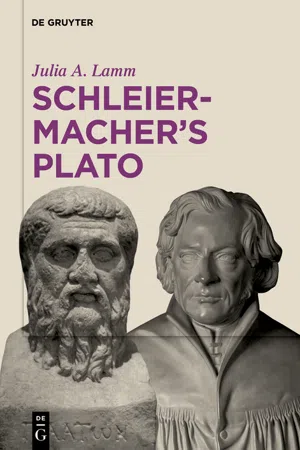1.1 Schleiermacher’s Achievement
Friedrich Schleiermacher (1768 – 1834) wrote these words as he commenced his deep scholarly engagement with Plato, which resulted in his six-volume masterpiece Platons Werke (Plato’s Works).2 His decades-long intensive work of translating and interpreting Plato would not stifle this early enthusiasm. Praise became virtual identification: “Plato is indisputably the author whom I know best and with whom I have almost coalesced.”3 The depth of the imprint on the subjective side, which such personal attestations capture, mirrored the breadth of influence on the objective side. Since the publication of the first volume of Platons Werke in 1804 until now, more than two centuries later, scholars have competed to find the best metaphor to convey what Schleiermacher accomplished. Already in 1816, Immanuel Bekker dedicated his critical edition of Plato’s dialogues to Schleiermacher as the “restorer of Plato” (Friderico Schleiermachero Platonis Restitutori).4 Heinrich von Stein (1833 – 1896) claimed that Schleiermacher’s introductions to Plato’s dialogues signaled a “geological fault” or “tectonic shifting” (Verwerfung) in the philological world.5 As recently as 2019, in Brill’s Companion to German Platonism, Schleiermacher’s Platons Werke is described as “an extraordinary turning point in Plato studies”6 and as “the most far-reaching revolution in Plato-interpretation since Marsilio Ficino’s translation and commentary in the fifteenth century.”7 That Schleiermacher changed the course of Plato studies is beyond doubt. Simply put, he changed how we understand Plato.
Unlike other philologists at the time, Schleiermacher set out to translate not just a dialogue or two but the entire Platonic corpus instead.8 His German translation of Plato’s dialogues dominated for over two centuries and even now continues to be influential as the “classic” one.9 More than that, however, he was determined to apply the newly emerging historical-critical method to Plato, which entailed identifying the authentic works of Plato and ordering those chronologically. That raised fundamental questions for a new, modern era: Who was Plato, and what is Platonic philosophy, once the accretions of centuries of Platonisms are scraped away? As important as Schleiermacher’s translation, therefore, was his interpretation of Plato developed in the accompanying introductions to the dialogues.10 In his famous “General Introduction” (Einleitung), he set forth his basic interpretive and methodological principles, which he then continued to apply in his introductions to the individual dialogues, as he painted a new portrait of Plato. As Stein put it, Schleiermacher “created a Platonic question.”11 And yet, in Schleiermacher studies, surprisingly little is known about how Schleiermacher understood Plato or how that may have influenced his own thinking.
1.2 The Question: Schleiermacher and Plato
The question of Schleiermacher and Plato may be approached from two different perspectives: from Plato studies, which seeks primarily to understand Plato better by asking how Schleiermacher might aid in that endeavor; or from Schleiermacher studies, which seeks primarily to understand Schleiermacher (or his era) better by asking how his Plato-interpretation might grant keener insight. The latter approach cannot be done without the former. Therefore, in chapter two, I examine what was new about Schleiermacher’s portrait of Plato and how his Platons Werke influenced philology, classics, and philosophy over the course of two centuries. Schleiermacher continues to be influential in Plato studies even now, although much of that discussion is relegated to notes and shorter forays. A notable exception is the attention given to Schleiermacher in recent decades by the so-called Tübingen School (Tübinger Platonschule), which is fiercely critical of Schleiermacher’s rejection of the unwritten Platonic doctrines.12 Although scholars associated with the Tübingen School represent a minority view, they tend to be vocal and prolific; somewhat ironically, precisely in their opposition to Schleiermacher, they have resurrected him as a Plato scholar. The publication of the new Schleiermacher critical edition of Platons Werke will most certainly stimulate renewed interest.13 In short, as a scholar of Plato, Schleiermacher still cannot be ignored.
The perspective taken in the present volume is that of Schleiermacher studies. Let us take a moment to orient ourselves in that field’s literature so as to assess the need for a full-length study of Schleiermacher and Plato. In general, German scholarship on Schleiermacher has demonstrated much greater awareness of the significance of Plato for him than has the secondary literature in English (or other languages), in no small part because of Germans’ greater access to the primary texts but also because Schleiermacher’s translation of Plato was the authoritative one in German. When Germans read Plato, they also held Schleiermacher in their hands. German-speaking students and scholars have thus enjoyed a more immediate acquaintance with Schleiermacher in relation to Plato than have we Anglophone students and scholars, who have had to arrive at that connection as a piece of information. Nonetheless, the work on Schleiermacher and Plato has remained surprisingly sparse given how significant and compelling the question is.
Wilhelm Dilthey (1833 – 1911), in his monumental biographical study of Schleiermacher’s thought, gave considerable weight to the importance of Plato.14 He argued that Plato, along with Spinoza and Shaftesbury, was a determining philosophical force in Schleiermacher’s thought. Also in the late nineteenth century, there was a published dissertation comparing Schleiermacher and Plato on virtue, but that relied mainly on Schleiermacher’s later essay on ethics, not on Platons Werke.15 A general lack of full-scale studies of the topic continued throughout most of the twentieth century. That is not to say, however, that there were not insightful contributions to the conversation.16 A significant shift occurred around the turn of this century due in part, no doubt, to the publication of the Meiner edition of Schleiermacher’s lectures on Socrates and Plato and, importantly, his Die Einleitungen zur Übersetzung des Platon, which were colle...




